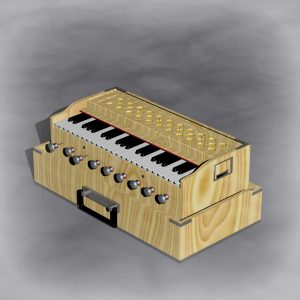 Acyutānanda dāsa: Gurujī, there are so many stavas and stutis (hymns and prayers) and aṣṭakams (prayers consisting of eight verses) in our paramparā. Of these, which are the most powerful?
Acyutānanda dāsa: Gurujī, there are so many stavas and stutis (hymns and prayers) and aṣṭakams (prayers consisting of eight verses) in our paramparā. Of these, which are the most powerful?
Śrīla Bhaktivedānta Nārāyaṇa Mahārāja: Oh, there are so many to Rādhā,
Kṛṣṇa, Mahāprabhu, Vṛndā, Vṛndāvana…
Acyutānanda dāsa: But…
Śrīla Bhaktivedānta Nārāyaṇa Mahārāja: First to guru, then to Nityānanda Prabhu, then to the all-merciful Caitanya Mahāprabhu, then to Śrīmatī Rādhikā.
Śrīpāda Mādhava Mahārāja: Giri Govardhāna.
Śrīla Bhaktivedānta Nārāyaṇa Mahārāja: That is later. After Rādhikā, then to Kṛṣṇa, then to Rādhā and Kṛṣṇa together, then to Girirājajī, then to Yamunā, Lalitā, and Viśākhā.
Acyutānanda dāsa: But…
Śrīla Bhaktivedānta Nārāyaṇa Mahārāja:
śrī-gaurāṅga-guṇānuvarṇana-vidhau śraddhā-samṛddhy-anvitau
pāpottāpa-nikṛntanau tanu-bhṛtāṁ govinda-gānāmṛtaiḥ
ānandāmbudhi-vardhanaika-nipuṇau kaivalya-nistārakau
vande rūpa-sanātanau raghu-yugau śrī-jīva-gopālakau
Śad-Gosvāmī-aṣṭakam (Verse 3)
[I offer my respectful obeisances unto the six Gosvāmīs, namely Śrī Rūpa Gosvāmī, Śrī Sanātana Gosvāmī, Śrī Raghunātha Bhaṭṭa Gosvāmī, Śrī Raghunātha dāsa Gosvāmī, Śrī Jīva Gosvāmī, and Śrī Gopāla Bhaṭṭa Gosvāmī, who are very much enriched in understanding of Lord Caitanya and who are thus expert in narrating His transcendental qualities. They can purify all conditioned souls from the reactions to their sinful activities by pouring upon them transcendental songs about Govinda. As such, they are very expert in increasing the limits of the ocean of transcendental bliss, and they are the saviours of the living entities from the devouring mouth of impersonal liberation.]
And for Nityānanda Prabhu:
sarac-candra-bhrāntiṁ sphuradamalakāntiṁ gajagatiṁ
hari-premonmattaṁ dhṛta-parama-sattvaṁ smita-mukham
sadāghūrṇan-netraṁ kara-kalita-vetraṁ kali-bhidaṁ
bhaje nityānandaṁ bhajana-taru-kandaṁ niravadhi
Nityānandāṣṭakam (Verse 1)
[I perpetually worship Śrī Nityānanda Prabhu, the root of the kṛṣṇa-bhakti tree, whose bright face mocks the full autumn moon, whose pure complexion glistens, whose gait is like that of an intoxicated elephant, who is always mad in kṛṣṇa-prema, who is the personification of pure spiritual energy, whose face wears a gentle smile, whose eyes are always rolling due to His absorption in kṛṣṇa-prema, whose lotus hand is beautified with a staff, and who, by the performance of nāma-saṅkīrtana, pierces the influence of Kali-yuga.]
For Rādhikā, Śrī Rādhā-kṛpā-kaṭākṣa, which begins with:
munīndra-vṛnda-vandite tri-loka-śoka-hāriṇī
prasanna-vaktra-paṇkaje nikuñja-bhū-vilāsini
vrajendra-bhānu-nandini vrajendra-sūnu-saṅgate
kadā kariṣyasīha māṁ kṛpā-kaṭākṣa-bhājanam?
[O Śrīmatī Rādhikā! Śukadeva, Nārada, Uddhava, and all the topmost munis are always offering prayers to Your lotus feet. Remembering You and praying for Your service miraculously removes all the miseries, sins, and offenses of the three spheres. Your joyful face blooms like a lotus and You delight in pastimes in the kuñjas of Vraja. You are the daughter of Vṛṣabhānu Mahārāja and the dearly beloved of Vrajendra-nandana, with whom You always perform vilāsa. When, oh when will You bestow upon me Your merciful sidelong glance?]
And for Kṛṣṇa, Namāmi nanda-nandanam. Especially, there are so many prayers for Rādhikā.
Acyutānanda dāsa: But if there is not so much time and I want to learn one…
Śrīla Bhaktivedānta Nārāyaṇa Mahārāja: You can learn one at a time, and you will gradually remember them all.
Ajaya-kṛṣṇa dāsa: During our Janmāṣṭamī and other grand festivals, is it all right that we invite professional people to perform?
people to perform?
Śrīla Bhaktivedānta Nārāyaṇa Mahārāja: When we observe Janmāṣṭamī in Mathurā, we call all the top professional radio and television singers and musicians who can play devotional songs on tabla and other instruments. We also call many top learned scholars, some of whom, like Vāsudeva Caturvedī, have degrees in seven subjects.
There are seven official gradations of professor degrees – Purāṇa, Kāvya, Vedānta, Chandaḥ, Nyāya, Vyākaraṇa, and Sāhitya – and certain teachers have degrees in all these subjects. In Vraja, in all of Uttar Pradesh and in all of India, there are no scholars like these. In all of Vraja, no one can speak in the Sanskrit language as they do. Yet, they see me like their guru.
Why do we call them? We do so in order to attract more people to come to our programs. When they come, a very, very large crowd also comes. At that time I speak hari-kathā to inject them with Kṛṣṇa consciousness, as I am injecting you all here. I inject the audience, the scholars, and the musicians. I also give the speakers praṇāmī (donations) and sweets. By this process, after some time practically all of Mathurā came to me.
Ajaya-kṛṣṇa dāsa: During our Janmāṣṭamī festival we put śālagrāma [Kṛṣṇa’a Deity in the form of a sacred stone] in a big cucumber. Then, at the moment of Kṛṣṇa’s birth, we take Him out in order to symbolize Mother Yaśodā giving birth to Kṛṣṇa. Some devotees objected to this. They said this is not bonafide.
Śrīla Bhaktivedānta Nārāyaṇa Mahārāja: On Janmāṣṭamī night, at midnight, not only in Mathurā but everywhere in Vraja and Uttar Pradesh and Bihar, this is followed. We also follow this. We keep a śālagrāma in a big cucumber.
Śrīpāda Mādhava Mahārāja: Or a big fruit, like a watermelon.
Śrīla Bhaktivedānta Nārāyaṇa Mahārāja: But especially we use the cucumber. Then, at the time of Śrī Kṛṣṇa’s birth, considering that Mother Yaśodā is giving birth to Kṛṣṇa, we take the śālagrāma out of the cucumber.
birth, considering that Mother Yaśodā is giving birth to Kṛṣṇa, we take the śālagrāma out of the cucumber.
So this is not apasiddhānta; it is not against the conclusions of Vedic scripture. Moreover this attracts many guests, and in this way we inject them with spiritual impressions.
Śrīpāda Mādhava Mahārāja: By that gathering, new devotees will come. Otherwise, the current of bhakti will stop.
Śrīla Bhaktivedānta Nārāyaṇa Mahārāja: We call everyone to the temple to hear hari-kathā, but why do we distribute so much delicious prasādam to them? This is not hari-kathā, so why do we do this? It is to attract them. We distribute prasādam to rich persons as well. By honouring that prasādam, they get sukṛti (pious credit).
[When Gauḍīya Vaiṣṇavas who are accomplished in the practice of bhajana assemble together to do kīrtana, they always sing the devotional songs according to krama (sequence).
Our ācāryas emphasize the necessity of praying to one’s gurudeva, the Vaiṣṇavas, and so forth, before commencing any act or supplication. For this reason, the maṅgalācaraṇa is recited before kīrtana begins. In traditional Gauḍīya kīrtana, songs are first sung to śrī guru, then the Vaiṣṇavas, Śrī Śrī Gaura-Nitāi, about the process of surrender (śaraṇāgati), and then to Śrī Śrī Rādhā-Kṛṣṇa. The kīrtana session ends with the singing of the mahā-mantra. (Śrī Gauḍīya Gīti-guccha)]
Walking with A Saint – Morning Walks and Conversations by
Śrī Śrīmad Bhaktivedānta Nārāyaṇa Gosvāmī Mahārāja
Image/Art made possible by Pixabay.com








